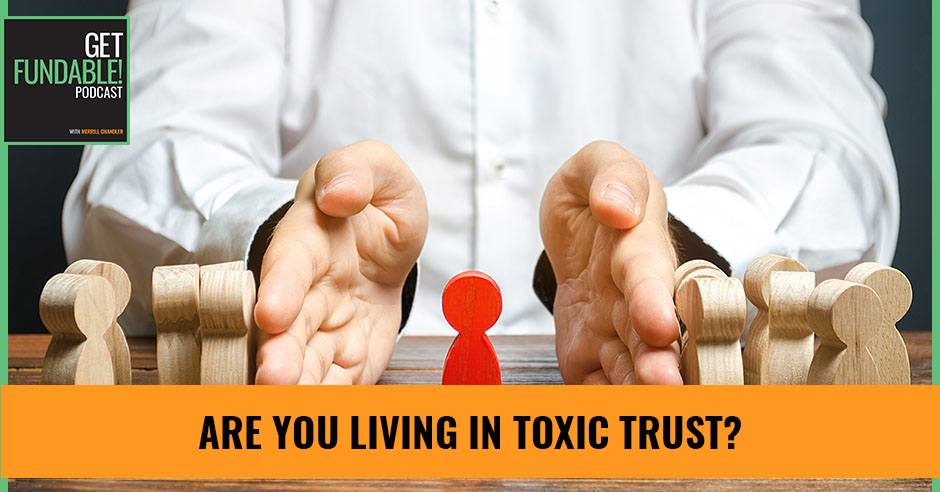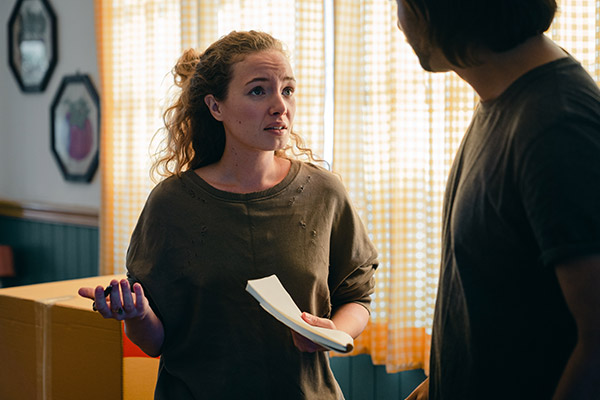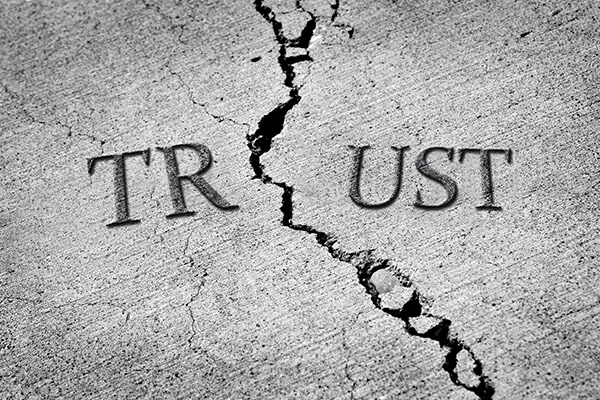
Putting trust in another person is truly an admirable thing to do. But by taking it for granted, toxic trust may eventually develop, causing selfish tendencies that actually hinder actual connections with others. Instead of putting ourselves in their shoes, we just impose our attitude and values onto them. Merrill Chandler discusses the four levels of trust, emphasizing why we should change our perspective on each one, from looking within ourselves to start looking outward. He also shares an emotional story of how he tried to connect with his son, who is going through a tough time, only to realize that his trust does not foster a meaningful fatherly emotion.
—
Watch the episode here:
Listen to the podcast here:
Are You Living In Toxic Trust?
The Secret Path To Leveling Up Connection
I love what we’re talking about. We’re going to be talking about the four levels of trust. This impacts your relationship with banks, your personal relationships, your business partners, your children, everything. When you say, “I trust you,” you have no clue what you’re talking about.
—
I said something pretty damn arrogant or you might even say it’s too bold for words. What do you mean if you tell somebody, “I trust you,” or somebody says, “I trust you,” to you? I don’t believe you know what you’re talking about. You have no idea what you said. We’re going to explore it, so that after you read this, when you say, “I trust you,” it’s not going to be the end of the sentence. You’re going to say, “I trust you,” and then you’re going to fill in some more words, because trust is a fuzzy thing for all of us. Trust is to have confidence in someone or something. I trust the sun’s going to come out. Why? We’re confident that the sun is not going to burn out, between now and tomorrow morning.
Fulfill My Expectations
To trust something is to have confidence in them. To truly believe that thing is real, but it’s going to come to pass. Let’s take a look at it and explore this a bit more. When we say, “I trust you,” there are four levels at which that trust is manifest. The problem is, since we don’t all operate from this same framework, you may be saying, “I trust you, honey,” and they may be hearing, “I trust you,” and it be completely different. The four levels of trust. The first level is the simplest and we grow in broader perspective. When we say, “I trust you,” what 99.9% of us are saying is, “I trust you to fulfill my unspoken expectations.” That’s what you’re saying. “Honey, I trust you to fulfill my expectations, the ones that I have not even communicated to you.”
Happiness is based on whether or not you're experiencing your values. Share on XSince you haven’t communicated, it may look based on your partner or your sweetheart or your children, they may have a different framework or a different value set. Remember how we keep talking about values. Happiness is based on whether or not you’re experiencing your values. When you trust somebody with a different set of values than you have, the word trust means a different thing. What do I mean by that? Someone says, “I trust you to be faithful to me.”
You the sayer, “I trust you,” means, that I trust you to treat every situation the way I would treat a situation. That’s what you’re saying. If you’re going to be honest with yourself, that’s not good communication. Let’s say that your sweetheart is a playful, gregarious, we could even call him a flirty type of person. It doesn’t mean anything to them. They’re not out seeking or connecting. They’re madly in love with you. When you say, “I trust you to be faithful,” the way it looks to you is you’re not a gregarious and playful person. You’re not flirty. You’re conservative, for the story’s sake. When you go into a party, a work event or whatever, the way you show up is based on your values, which is, “I don’t mix it up with people. I don’t flirt. I’m not out in the world. I’m an introvert, but my sweetheart is an extrovert.”
They get a buzz off of talking with and playing with other people. When you see them be their way, it looks like you said, “I trust you to be faithful,” but they’re exhibiting what you believe is untrustworthy behavior, but it’s untrustworthy behavior if you were to act that way, because that’s who you are and that’s your value set. How many arguments, pain and suffering do we go through, because they’re doing it differently than we do it so they’re not being faithful?

Toxic Trust: When you trust somebody with a different set of values, then the word trust means a completely different thing.
In their world, they’re not being unfaithful, not looking and not flirting. They’re just having a great day time, but it looks hurtful and betrayal behavior to you. When we say, “I trust you,” you’re saying, “I trust you to be like me in this situation. I trust you to handle a situation as I would handle it, but I haven’t told you what my expectations are. I haven’t told you how I would handle it.” We project it onto them and demand that they handle it like we handle it without a discussion. Besides horribly not being fair, all of this pain and suffering that we have is because you didn’t communicate how you would handle situations or how you would act in that moment. Every situation can come be this way.
It isn’t about faithfulness. It’s about how you would handle disciplining an employee. Your business partner says, “We need to write them up.” You’re like, “Why would we write them up?” It’s a common error. I trust you to have my back and have the businesses’ back and that is not appropriate behavior. You haven’t talked about what is appropriate behavior. One person is like, “It’s coming in late. We need to discipline them, but giving me a written warning to fire them, that’s a little much, don’t you think? Let’s give him another chance.” Neither way is right or wrong. What’s right or wrong is if you have agreed on the standard of behavior. I trust you as my business partner to act as I would, without creating an unemployment policy about what tardiness and lates looked like to the business and agreeing on it ahead of time.
Most of us don’t say, “I trust you in the business,” but that is how we operate in our mind. My partner isn’t having the back, doesn’t have the company’s back and isn’t prioritizing the company. When the other partner is looking at you going, “Why are you being harsh? Give them another chance,” because you haven’t come to an agreement. That leads us to our second level of trust. First level is I trust you to respond to this situation like I would respond and not tell you about it, just expect you to do it. Anger and frustration, resentment and heartache are in the world as a result. The second layer of trust leads into what we were saying. You agree on something, you give your word.
Look into the heart and soul when searching for intention. Share on XTrusting Your Word
The second level of trust is, “I trust you at your word.” What does that mean? Let’s go back to our partners in a business. When you say, “Here is the policy that we have for treating employees who are tardy.” That’s giving your word to behave in a certain way, “I’m trusting you to honor this policy. I’m trusting you to keep your agreement since we have such different perspectives. We fought hard to come to something we could both live with. I’m trusting you to keep your word.” A situation comes up, who’s tardy, then all of a sudden you have an agreement. If one of you break your word, that looks like untrustworthy behavior. It’s a betrayal to the company. I trust you at your word.
Trusting Who You Are
The next level is, “I trust you to be who you are.” This is a next level up, “I trust you at your word,” but that’s like if you’ve got an alcoholic and someone sets a beer in front of you or otherwise and they swear they’re not going to drink it, but who they are is someone who consumes alcoholic beverages, especially free ones that are put in front of them. Now, I have to trust them to be who they are, even if they give me their word. We have to look into the heart and soul of our business partners, our loved ones, our children, our parents. We have to look into the heart and soul and look for intention. We’re not here to judge their intention. We’re here to create clarity in our own heart, because we’re the ones who are miserable if we can’t trust somebody. That’s when we get hurt.
Notice, you’re sitting there, you trust someone at their word and they don’t do it. You got to trust somebody to be who they are. Let’s go back to our employer as an example. The partner looks at him and says, “Yes, we agreed on this.” They’re a bleeding-heart liberal. They’re always going to give somebody a chance. They’re always going to, “I got to trust that the business, I love my partner.” They’re always going to act a certain way when it comes to these types of things, “I got to trust them to be who they are even if they made me a promise.”

Toxic Trust: Pain and suffering are usually caused by not communicating how you would handle or act in certain situations.
Trusting The Journey
I’m not saying we have to stay in business with these people. I’m not saying we have to stay in these relationships. I’m telling you how to navigate these crazy, difficult situations, where you get to stay in charge of your experience, where you get to take care of you. Once I’ve given somebody my word, but what I promised is not who I am, then the next level of trust is to trust me to be the truth of me. I may break my promise because that’s who I am or where I am in my life. The last one is the most liberating, freeing and the most difficult. The last layer level of trust is to trust the journey. Like I do, some of you may believe that there’s a point and a purpose. There’s something to learn in every moment.
Some say there are no accidents. If you been in an accident, you don’t want to believe that one, but what if it’s true? What if things happen for a reason? I don’t want to get all philosophical on it, but I don’t believe there’s a better way to treat life. It doesn’t matter to me if it’s true, there is no accident or there’s a point and purpose to everything, but I don’t believe there’s a better way to live my life, unless I believe that. It doesn’t matter. What if the universe is a cold, hard, empty place and this is all bullshit? My life becomes meaningless, fast. I prefer to say that there is a point and a purpose, even if I don’t know exactly what it is.
There's no better way to live your life unless you believe that is the case. Share on XIf there’s a point in a purpose, then what if I trust life? What if I trust it, that I trust life more than I trust somebody to fulfill my unspoken expectations? What if I trust life more than I trust somebody at their word? What if I trust life more than trusting someone to be the truth of who they are? What if I trust the journey? What if I trust the path that I’m walking? Just for an experiment, what if I believe that there is something meaningful from everything that I’m experiencing. I love living my life that way and I invite you to explore it if you’re not already living that way. This is all great in theory, but how do we translate this?
Experience With My Son
I would love to share with you my experience with my son. It’s difficult for me to talk about it because I learned these levels of trust from the brutal, heartbreaking experience I’ve had with my son. My son for several years has been battling for his soul against heroin and drug addiction. It has been brutal on him and the family. First-level, I look at him as he’s shared it with me. We send him to rehab and I trusted him to fulfill my unspoken expectations, “You go to rehab, you follow the plan, you do the thing and you become healthy, you become sober.” What am I doing? I had the gall, the audacity to put on him my way in the world, “I’m the checklist guy. What’s next? How do I become sober? Check.”
He came out of rehab and I’m sitting there face-to-face with him. I love this boy with all my heart. He’s a teenager. I say, “I trust you, son.” What I didn’t say and what I wasn’t aware of until later, is I was saying, “I trust you not to hurt me anymore.” I wasn’t stepping into his shoes. I didn’t know what his world was about. I didn’t know how he felt about what was going on. He wanted to fulfill my expectations. He wanted to do right by me. He knew I loved him. I know with all of his heart, he loves me, but love is not as powerful as we wish it were in many things in our life. “I trust you. You got this, son.” Playing cheerleader, but what I was telling him is that, “I trust you to fulfill my expectations, to not hurt me.”

Toxic Trust: If you are disappointed by somebody’s behavior and you’re still at level one of trust, that’s on you.
Months and years passed. Rehab one, rehab two, opportunity one, opportunity two. I don’t share that he failed because he never failed in his journey more than that in a moment. I believe he failed me because I wasn’t stepping into his shoes. I wasn’t walking with him. I was calling him up to the place on the trail where I was, when he wasn’t ready to travel that particular path yet. He began, “I promise, dad, I’ll not use again.” I’m like, “I trust you to keep your word.” That’s like putting a 20-pound pack on a three-year-old child. He didn’t yet have the capacity to carry that, especially by himself, which I left him there to carry it on his own because I trusted him at his word. “You made the promise, let’s do it together.” Cheerleader. The demons that he’s carrying are too heavy.
My safety zone was be like, “I can’t trust him at his worst. I’ll trust him to be who he is.” I still had expectations of who he was. I was either in denial or deluded. This one’s embarrassing. There was a time when I wanted to relate to him. I wanted to relate to what he was doing. What did I do? I put on some grubby old clothes and ruffled up my hair and got a little grungy. I went out and spent three days living on the streets, trying to step into his shoes. While that was miserable, bundled up in a blanket, sleeping on cardboard, the arrogance that I had, because I knew that after 2 or 3 days, whenever I chose out that I’d go take a shower, I’d go back to my life, and everything was hunky-dory, but I would know what it felt like to be my son who is addicted to heroin. That was not cool because my heart is huge for him, but unknowingly, I used it against him because I know what it feels like to be out in the cold, sleeping on cardboard and yet I still hadn’t climbed into his experience.
When I said I trusted him to be who he was, I labeled him. That made it a safe place in my heart. I could shield myself from the pain of my only son battling for his soul. I steeled my heart against him and his experience to protect myself. Those of you who have had these types of experiences, you know you’re trying to do it right. You’re trying to show up for them. Sometimes there is no showing up. That’s what I learned the fourth level of trust. I had that beat into me is that I have to trust that life and the divine energy, the divine soul, that amazing boy is now a full-grown man. There is a point to all of this.
Love is not as powerful as we wish it were in many things in our life. Share on XDo I know that in the objective world? I’ve got no clue but it doesn’t serve me or him for me to believe that it’s meaningless. The fourth level of trust, I learned this by trusting his journey and his life that I do what I can, where I can, but he is in this space for a point and a purpose. When he asks me for money, “What is it for?” When he needs something from me? I do the best that I can so that I don’t enable and at the same time, isolate him and abandon him. This is the hardest thing I’ve ever done in my life. It is 2% of what he is facing, what all of our loved ones, our family members and people we care about who face similar challenges.
I learned the hard way about what it means to trust. I was taken off of my arrogance. I had to abandon my thoughts and ideas of addiction, thoughts and ideas of what it is to love someone, what it is to be loved back by someone. This has pulled the rug out of everything in my life. I’m still that guy. I’m still me. I’m still Merrill. What do I do? I optimize everything, That’s who I am. We’ve got this big Get Fundable on the back wall, but it doesn’t mean that I stopped being who I am when I’m talking about my son. I optimize everything.
This is a peak in creating a gentle, compassionate, clear and loving relationship with the people in your life, by you knowing what you mean by trust. If you are disappointed by somebody’s behavior and you’re still at level one of trust where you’re expecting you to fulfill your unspoken expectations and act like you in a situation without telling what it means to you, that’s on you. You get to suffer. I certainly did. I suffered like a madman until I learned this. Hopefully, you get to cheat and learn this the easy way.

Toxic Trust: You don’t get to use broken trust as a weapon to cover your own pain and suffering in a relationship.
Nonetheless, I learned that when I agree on a standard of behavior, what does it mean to keep one’s word? I do everything in my power to be a man of integrity and keep my word or not make a promise. At least if I know that someone is going to not keep their word, then I don’t hold them to it. If it’s not where they are on their journey, you cannot hold them to their word if you know. You don’t get to guilt them, you don’t get to shame them, which is all the things that I did with my son. You don’t get to use trust and broken trust as a weapon to cover your own pain and suffering in this relationship like I did.
If you trust them to be who they are, there is a gentleness and a sense of calm that came over me where I could say, “This is my son now, not who he was or who he will be. I trust him to keep walking his path. I trust him that he will treat certain things.” At Christmas, I give my children money at Christmas, in the form of $100 bills that they can take advantage of all the sales after Christmas or get the things that they want or save it or do whatever their value set is.
My son asks me to hold his Christmas money and then we have a discussion whenever he wants some of it to use because he’s taken it all and blown it on things that didn’t support what he said were his goals for his life. That only came after years and years of guilting, shaming and bullshit that I loaded on him because I was trying to protect me from feeling pain. I know those of you who are reading, you know how much it hurts to not know how to love somebody. Finally, every one of us, I guarantee you, whether you learned it yet or you’ll learn it the day before you die, but every one of us will learn to trust the process, trust the journey and that there is a point to all of it. I encourage you to love, trust and take care of your loved ones in every way you possibly can. Be well.
Love the show? Subscribe, rate, review, and share!




